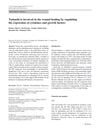1 citations,
August 2023 in “Biomolecules” Certain immune-related proteins are higher in people with alopecia and their healthy relatives, hinting at a genetic link.
January 2014 in “Journal of Jilin University” Higher levels of certain immune cells and proteins are linked to more severe lupus symptoms.
[object Object]  July 2024 in “Journal of Investigative Dermatology”
July 2024 in “Journal of Investigative Dermatology” Losing both ERBB2 and ERBB3 receptors in mice causes significant skin problems and inflammation.
 144 citations,
November 2020 in “Frontiers in immunology”
144 citations,
November 2020 in “Frontiers in immunology” Targeting the IL-23/IL-17 pathway effectively treats several inflammatory skin diseases.
 1 citations,
May 2023 in “Prospects in Pharmaceutical Sciences”
1 citations,
May 2023 in “Prospects in Pharmaceutical Sciences” New cytokine-targeted therapies show promise for treating alopecia areata.
 278 citations,
March 2013 in “Gut”
278 citations,
March 2013 in “Gut” Anti-IL-12/IL-23 antibody therapy effectively treats psoriasiform skin lesions in IBD patients.
 February 2023 in “Research Square (Research Square)”
February 2023 in “Research Square (Research Square)” Blocking IL-17 can reduce skin inflammation in a mouse model of pityriasis rubra pilaris.
 20 citations,
November 2005 in “Journal of Investigative Dermatology Symposium Proceedings”
20 citations,
November 2005 in “Journal of Investigative Dermatology Symposium Proceedings” IFN-γ and IL-2 are important for T cell activation in hair loss in mice.
 15 citations,
January 2010 in “Experimental Dermatology”
15 citations,
January 2010 in “Experimental Dermatology” Hair loss in certain young mice is linked to a specific gene and can be caused by lack of iron.
 12 citations,
December 2017 in “Food and chemical toxicology”
12 citations,
December 2017 in “Food and chemical toxicology” Permanent hair dye mixtures can irritate and damage the skin.
 23 citations,
December 2021 in “Frontiers in Immunology”
23 citations,
December 2021 in “Frontiers in Immunology” IL-1 family cytokines are crucial for skin defense and healing, but their imbalance can cause skin diseases.
[object Object] 6 citations,
October 2021 in “Biomedical Research and Therapy” Alopecia areata patients have higher levels of IL-6 and TNF-α.
4 citations,
October 2020 in “The journal of investigative dermatology. Symposium proceedings/The Journal of investigative dermatology symposium proceedings” IL-4 and IL-13 might play a role in a type of hair loss similar to alopecia areata.
 8 citations,
May 2018 in “The Journal of Allergy and Clinical Immunology”
8 citations,
May 2018 in “The Journal of Allergy and Clinical Immunology” Activating the Nrf2 pathway reduces inflammation and cell activation in human hair follicles, suggesting a potential treatment for certain hair loss conditions.
 3 citations,
March 2020 in “International Journal of Dermatology”
3 citations,
March 2020 in “International Journal of Dermatology” Tildrakizumab showed limited effectiveness in treating chronic alopecia areata in a small group of patients.
 60 citations,
September 2015 in “Expert Review of Clinical Immunology”
60 citations,
September 2015 in “Expert Review of Clinical Immunology” Lymphocytes, especially CD8+ T cells, play a key role in causing alopecia areata, and targeting them may lead to new treatments.
 16 citations,
October 2020 in “Lipids in Health and Disease”
16 citations,
October 2020 in “Lipids in Health and Disease” Leptin affects skin and hair health and may worsen some skin conditions, but more research is needed to understand its full impact.
 12 citations,
May 2018 in “JAAD Case Reports”
12 citations,
May 2018 in “JAAD Case Reports” A man's gray hair got darker and thicker after using a psoriasis drug.
 11 citations,
January 2017 in “Oxidative medicine and cellular longevity”
11 citations,
January 2017 in “Oxidative medicine and cellular longevity” Antroquinonol may help prevent skin depigmentation by suppressing certain immune cells.
 3 citations,
April 2019 in “The journal of investigative dermatology/Journal of investigative dermatology”
3 citations,
April 2019 in “The journal of investigative dermatology/Journal of investigative dermatology” ILC1 cells contribute to hair loss in alopecia areata.
 April 2017 in “Journal of Investigative Dermatology”
April 2017 in “Journal of Investigative Dermatology” Cow milk sugars increase fat production and inflammation in skin oil cells.
 130 citations,
November 2017 in “Frontiers in Immunology”
130 citations,
November 2017 in “Frontiers in Immunology” The conclusion is that Treg-targeted therapies have potential, but more knowledge of Treg biology is needed for effective treatments, including for cancer.
 41 citations,
February 2001 in “Current pharmaceutical design”
41 citations,
February 2001 in “Current pharmaceutical design” Current and future treatments for alopecia areata focus on immunosuppression, immunomodulation, and protecting hair follicles.
 40 citations,
August 2022 in “Frontiers in immunology”
40 citations,
August 2022 in “Frontiers in immunology” Blocking JAK/STAT pathways can help treat hair loss from alopecia areata.
 36 citations,
December 2015 in “Drugs”
36 citations,
December 2015 in “Drugs” New treatments for a chronic skin condition show promise, but individualized plans are crucial due to varying responses.
 21 citations,
August 2014 in “Journal of Cell Communication and Signaling”
21 citations,
August 2014 in “Journal of Cell Communication and Signaling” Tsukushi helps control inflammation and aids in wound healing.
 12 citations,
March 2016 in “BBA clinical”
12 citations,
March 2016 in “BBA clinical” Increased Toll-like receptors in blood cells may contribute to alopecia areata and could be a target for new treatments.
 6 citations,
March 2019 in “Dermatologic surgery”
6 citations,
March 2019 in “Dermatologic surgery” Chilled ATPv-supplemented saline best preserves hair grafts' key genes.
 3 citations,
May 2023 in “Frontiers in immunology”
3 citations,
May 2023 in “Frontiers in immunology” Faulty inflammasome activation may lead to autoimmune skin diseases and could be a target for new treatments.
21 citations,
December 2005 in “The journal of investigative dermatology/Journal of investigative dermatology” T-cells in alopecia areata scalp show abnormal regulation, leading to less inflammation.
























